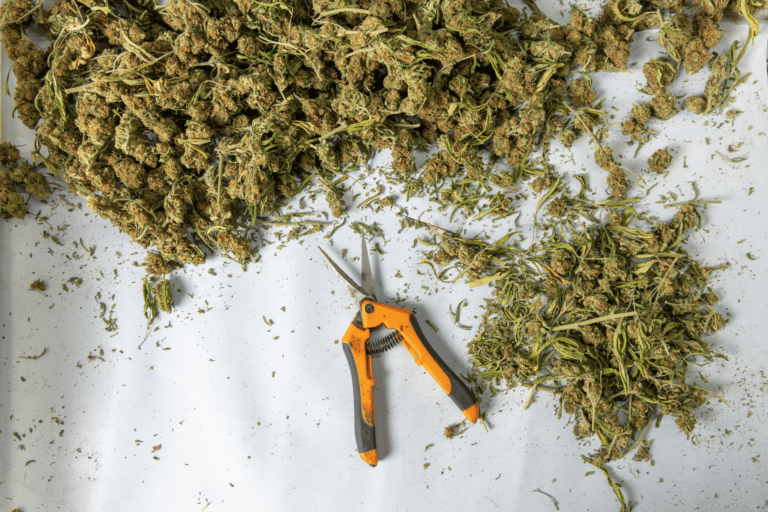The Economic Impact of Marijuana Legalization
by Haley Mills · April 21, 2023
Learn about the economic impact of marijuana legalization and how it affects society. Discover the potential benefits and drawbacks of legalizing cannabis.

The debate surrounding marijuana legalization has been contentious for decades, with passionate arguments from advocates and opposers. Beyond the moral and social implications, one of the most significant aspects of this discussion is the potential economic impact of legalizing cannabis. As more states and countries move towards embracing marijuana legalization, it is crucial to understand and examine the economic consequences of this shift.
This article will explore the various ways in which marijuana legalization has impacted economies around the world, with a focus on job creation, tax revenue, and effects on other industries. We will also delve into potential drawbacks and the long-term implications of this global trend.
Key Cannabusiness Statistics
- Market size: In 2020, the global legal cannabis market was valued at approximately $20.5 billion. It is projected to grow at a compound annual growth rate (CAGR) of 28.0% from 2021 to 2028, reaching $84.0 billion by 2028
- U.S. market: In the United States, the legal cannabis market was valued at around $13.6 billion in 2019 and is projected to exceed $41.5 billion by 2025
- Job creation: The cannabis industry is a significant job creator. In 2020, the U.S. cannabis industry employed an estimated 321,000 full-time workers, expected to grow as more states legalize marijuana.
- Tax revenue: States with legal marijuana markets have generated substantial tax revenue. For example, as of September 2021, Colorado had collected over $1.7 billion in total marijuana tax revenue since retail sales began in 2014
- Medical marijuana: By September 2021, medical marijuana was legal in 36 U.S. states, four U.S. territories, and the District of Columbia. The number of medical marijuana patients in the U.S. was estimated to be around 4.4 million in 2020
- Recreational marijuana: As of September 2021, recreational marijuana use was legal for adults in 18 U.S. states, two U.S. territories, and the District of Columbia. More states were considering legalization through legislative measures or ballot initiatives.
Types of Cannabis Businesses
The cannabis industry has experienced remarkable growth in recent years, fueled by increasing legalization and social acceptance of its use. As the industry expands, diverse businesses have emerged, each playing a unique and vital role in the supply chain. This section aims to overview the primary types of cannabis businesses: licensures, growers, manufacturers, testing and labeling, distributors, dispensaries, and delivery services. As the market evolves, these businesses will be key players in meeting the growing demand for cannabis products and ensuring their quality, safety, and accessibility.
Licensures
A crucial aspect of the cannabis industry is the process of licensing businesses to operate legally within the space. Licensures are the regulatory bodies responsible for granting licenses to cannabis-related companies, ensuring they adhere to strict guidelines and regulations. These entities are critical in maintaining the industry’s integrity, as they enforce compliance and help prevent illicit activity. As the market grows, it is projected that the demand for licensure services will continue to rise, generating significant revenue in the process.
Growers
Growers, also known as cultivators, are responsible for the actual production of cannabis plants. They are vital to the industry as they provide the raw materials necessary to create various cannabis products. Growers employ different cultivation techniques, such as indoor hydroponics and outdoor farming, to produce high-quality cannabis strains.
As the industry expands, growers will continue to innovate and optimize their methods to meet the increasing demand for cannabis. The growth in the market is expected to result in substantial earnings for these businesses.
Manufacturers
Cannabis manufacturers are critical in processing raw cannabis materials into various products, such as edibles, concentrates, tinctures, and topicals. These businesses contribute to the industry’s diversity by offering consumers a range of consumption methods beyond traditional smoking. As the market continues to mature, manufacturers are expected to invest in research and development to create innovative new products, fueling further growth in the industry and generating significant revenue.
Testings & Labeling
Testing and labeling companies are essential to ensuring the safety, quality, and consistency of cannabis products. They perform laboratory tests to determine the potency, purity, and presence of contaminants in cannabis products, providing consumers with accurate information about the products they are purchasing.
These businesses also ensure that products are appropriately labeled with the correct information, further contributing to consumer trust and confidence. The growth of the cannabis industry is likely to result in increased demand for testing and labeling services, translating to higher earnings for these companies.
Distributors
Cannabis distributors serve as intermediaries between growers, manufacturers, and retailers, facilitating the transportation and storage of cannabis products. They play a vital role in maintaining the supply chain’s efficiency and reliability, ultimately ensuring that products reach consumers promptly. As the cannabis market expands, the need for efficient distribution networks will grow, driving revenue for these businesses.
Dispensaries
Dispensaries are retail outlets that sell cannabis products directly to consumers. They play an essential role in providing access to various cannabis products and serving as a source of information and guidance for customers. Dispensaries are crucial in shaping the public perception of the industry, as they represent the primary point of contact between the cannabis market and consumers. The growing demand for cannabis products will likely increase sales and earnings for dispensaries.
Delivery
Cannabis delivery services cater to the growing demand for convenient access to cannabis products by offering door-to-door delivery. These businesses help expand the industry’s reach, making it more accessible to customers who may not have easy access to a dispensary or prefer discreet purchasing options. As consumer preferences shift towards convenience and the cannabis market grows, delivery services are expected to experience massive growth as legalization expands.
The Legalization of Marijuana
Legalizing marijuana has been a hotly debated topic for decades, with proponents arguing for the numerous medical, economic, and social benefits of legal cannabis. At the same time, opponents highlight concerns about public health and safety. As attitudes towards marijuana shift globally, many countries and states embrace its legalization, leading to a thriving cannabis industry.
The United States
In the United States, the movement to legalize marijuana has gained significant momentum over the past few years. As of September 2021, medical marijuana is legal in 36 states, while recreational use is permitted in 18 states and the District of Columbia. US legalization efforts have primarily been driven by state-level initiatives, often through ballot measures or legislative action.
The economic impact of marijuana legalization has been substantial, with states like Colorado, California, and Washington experiencing significant growth in tax revenue and job creation within the cannabis industry. Furthermore, the legal cannabis market has generated billions of dollars in revenue, which has been used to fund education, public health initiatives, and infrastructure projects.
As more states continue to legalize marijuana for recreational and medical use, the US cannabis industry is expected to witness even more significant growth in the coming years. If the federal government updated its marijuana laws and the Controlled Substances Act, the industry would grow even further.
Worldwide
The trend toward marijuana legalization is not limited to the United States. Several countries worldwide have also taken steps to legalize medical and recreational cannabis use, driven by changing public opinion and the potential for economic growth. Notably, Canada became the second country in the world to fully legalize recreational marijuana in 2018, following Uruguay’s lead in 2013. Additionally, many European countries, such as Germany, Italy, and the Netherlands, have implemented medical marijuana programs or decriminalized possession of small amounts of cannabis.
How would full US legalization affect the industry?
If the United States were to legalize marijuana at the federal level fully, the cannabis industry would likely experience a transformative shift, with implications for marijuana sales, cultivation, consumption, ways to possess marijuana, and the end of prohibition. This change would create a more cohesive and regulated market, opening new opportunities for economic growth nationwide and in local governments, innovation, and social progress.
With full legalization, the US cannabis market would likely see a significant increase in sales due to the removal of legal barriers and the normalization of marijuana use. Expanding the legal market would also help reduce the size of the illicit market, as consumers would have more access to regulated, safe, and high-quality cannabis products. As a result, the legal cannabis industry would generate even more tax revenue for states and the federal government, which could fund various public services and initiatives.
In terms of cultivation, full legalization would create a more unified regulatory framework for growing marijuana plants. This would improve standardization and quality control across the industry, leading to better consumer products. Furthermore, removing federal restrictions would allow growers to access financial services, insurance, and other resources currently limited due to the federal prohibition of the cannabis plant. This could lead to increased investment in research and development, driving innovation in cultivation techniques and sustainability practices.
With the full legalization of marijuana, the social stigma surrounding smoking marijuana would likely continue to diminish. As a result, a wider range of consumers might be more inclined to try legalized cannabis products, including those previously deterred by its legal status or negative perceptions. This change could lead to increased demand for diverse products, such as edibles, tinctures, topicals, and traditional smoking methods. Moreover, full legalization of the use of marijuana would likely encourage further research into the potential medical and therapeutic benefits of cannabis, leading to a better understanding of its various applications and effects.
The end of marijuana prohibition in the United States would have significant social and criminal justice implications. By removing criminal penalties for marijuana possession and use, the country could reduce the burden on the criminal justice system and reallocate resources to more pressing issues. Moreover, full legalization by the federal law would help address racial disparities in marijuana-related arrests and convictions, leading to a more equitable society and, hopefully, marijuana opportunity reinvestment.
In Conclusion
The economic impact of marijuana legalization is a multifaceted and complex issue. As we have seen, the legalization of cannabis has the potential to generate significant revenue through taxation, create jobs, and stimulate growth in ancillary industries. However, it is essential also to consider potential drawbacks, such as the need for regulation, public health concerns, and the potential for market saturation.
Ultimately, the economic impact of marijuana legalization will evolve as more jurisdictions adopt and adapt their policies. As we move forward, it is crucial for governments, businesses, and communities to work together to ensure that the potential benefits are maximized while minimizing any adverse effects on society.
Last Updated: August 8, 2024
Get Approved for Your Medical Marijuana Card in Minutes!

Get Your Medical Card
Connect with a licensed physician online in minutes

Like This Article?
Share with your friends
Table of Contents
Keep Reading
-
How Can I Use Leftover Leaves and Stems?
Don’t throw away all that marijuana trimming! Learn how to use your leftover leaves and stems to create delicious edibles, make homemade extracts, and more.
-
5 Steps to Find a Medical Marijuana Card Doctor Near Me
Find a qualified medical marijuana card doctor near me with these essential steps.
-
Stay Updated: Latest Marijuana Legislation News
Don’t be left in the dark about marijuana legislation updates. Stay informed and up-to-date with the latest news on marijuana laws by clicking now! Don’t miss out – stay in the loop!



